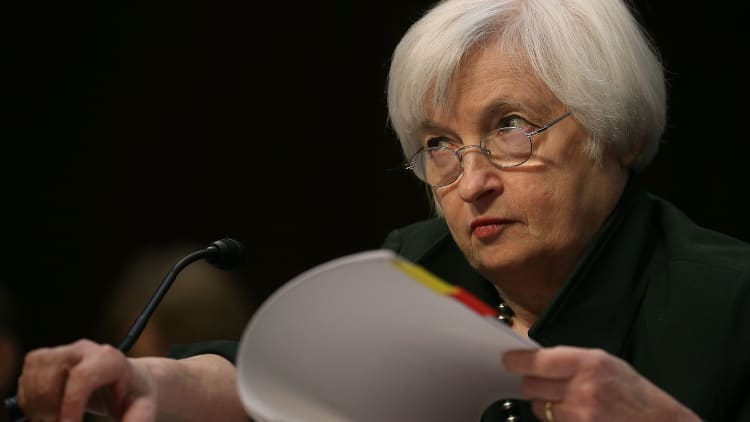
Fed Chair Janet Yellen faces the new Republican Congress for the first time this week and the hot seat could be a bit more fiery than usual.
As Yellen gives testimony on Tuesday and Wednesday, the first point of interest will be whether Yellen provides any more guidance on the possibility of a March rate hike. Markets have so far written off the chance, pricing in just an 18 percent probability of a quarter-point move, according to Thomson Reuters.
But many economists say that's too low, given that Yellen is likely to signal that the Fed is close to meeting its inflation and employment goals set by Congress.
The trouble for the market is this: Can Yellen hit just the right tone where she claws back some flexibility for the Fed to hike in March and yet not signal that it's a done deal? If so, Yellen will seek just the right hawkish language to bring that probability to just about 50 percent so she can leave it to the Federal Open Market Committee to make the actual decision.
And Yellen has to pull all of this off in a Congress where Republicans have been skeptical about low rates.
Economically when it comes to a March hike, much depends on the February jobs report, and especially wage growth. Weak wage increases in January prompted the market to further dismiss the chance of a hike. But some economists think wage gains could bounce back with the next jobs report. February inflation readings, to be released this Wednesday, will also likely show an uptick.
But politics also play a role. The Fed so far has been reluctant to factor in much, if any, stimulus from the new Trump administration. Even while markets and even some forecasts have built in additional federal spending and tax cuts, many on the Fed have insisted that the timing, magnitude and makeup of the President Donald Trump's economic plans are too unclear to be reliable.
"There is ... significant uncertainty about what's going to happen,'' Fed Vice Chairman Stan Fischer said this weekend. "I don't think anybody quite knows what's going to come out of the process which involves both the administration and the Congress in deciding on fiscal policy and a variety of other things."
The only nod the Fed gave to the altered outlook in its February statement was to note rising business and consumer confidence. But that was not accompanied by much of a change in the economic outlook.
The other trouble for the Fed is this: the average Fed official has forecast three rate hikes this year. By moving in March, that is, early in the year, it could send a signal that there are more than three rate hikes on the way. And yet, by waiting, it could miss an opportunity of relative calm in which to hike and then be forced to raise rates at successive meetings with news conferences (a preferred time for the Fed to hike) in June, September and December.
Even though the rate outlook is the most critical question for markets, it's not always a prime concern for Congress. It's easy to imagine congressional Republicans peppering Yellen with questions on her view of what's wrong with the economy and looking for support for their ideas that tax cuts and deregulation are the right prescriptions.

Democrats will take the opposite view, and ask about the drawbacks of deficits, which they believe Trump's policies are likely to increase.
Yellen has tried not to get in the middle of political debates but has suggested the economy is near full employment and that short-term stimulus is not needed. Instead, she has prodded lawmakers to focus on an economic agenda that stimulates productivity.
Yellen can expect to be in the middle of the same debate when it comes to replacing or amending the Dodd-Frank regulatory reform law. While the president has talked about drastic reform of the law, the executive order he signed didn't quite read that way. In fact, Fed Governor Dan Tarullo, the leading Fed official on writing the
In fact, Fed Governor Dan Tarullo, the leading Fed official on writing the Dodd-Frank regulations, told the Financial Times over the weekend that the principles laid out by the president are a "perfectly good starting point.'' Tarullo announced his resignation from the Fed last week, effective in April, giving Trump three Fed seats to fill.
The vacancies raise the question about when or if congressional Republicans will pursue overall reform of the Federal Reserve. They have sought — unsuccessfully, so far — to force the Federal Reserve to adopt a rule to govern its monetary policy and to allow for auditing of the Fed's monetary policy process. The Yellen Fed has opposed both, arguing that auditing its rate decisions would inject politics into its meeting and that rules work well as guideposts but don't offer the right solution for real-world policymaking.
The questioning of Yellen should give a hint of how much the current Congress, with so much on its plate from tax reform to Obamacare to banking regulation, might have an appetite for taking on Fed reform. The alternative could be to wait.
Trump will have the ability, around the summer of 2018 and perhaps earlier, to appoint five new Fed governors. If they agree with Republican sentiments, they could alter the Fed's own procedures by themselves, and Congress wouldn't have to get involved.


